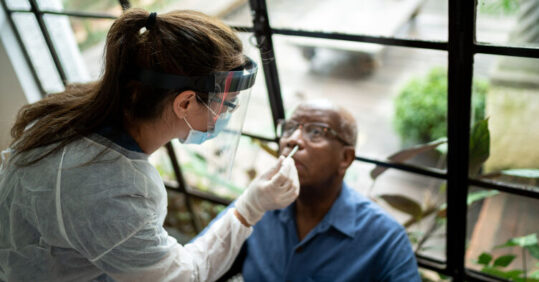Routine Covid-19 testing for care homes to end

Routine symptomatic Covid-19 testing for residents and staff in care homes across England is ending, the government has announced.
Related Article: ‘Patients not prisoners’: Palliative care nursing behind bars
It was also confirmed that routine symptomatic testing would end in prisons, places of detention, homelessness and refuge settings, as well as asylum settings.
The announcement also includes the end of all funded PCR testing outside of the NHS.
The UKHSA said that testing in England will now be ‘further aligned with the management of other common respiratory infections,’ a move made possible by high vaccination coverage and increased availability of therapeutic treatments.
Dr Dame Jenny Harries, the UKHSA’s chief executive, said: ‘Fewer people now experience severe illness due to Covid-19 due to vaccinations, infection-related immunity and treatments for those who need them and the risk of hospitalisation has decreased overall.
‘This means we are now able to further bring our testing programmes in line with management of other viral infections whilst still maintaining focus on those at highest risk to protect them from the virus.’
Related Article: NHSE confirms dates and eligibility for autumn Covid and flu jabs
These changes form part of the government’s planned transition to ‘living with Covid-19’, which involves a gradual scale back of testing services.
Lateral flow devices will replace the use of PCR testing in the NHS and routine testing using these will still be available for the following groups:
- Residents in care and high-risk settings if they have symptoms and are eligible for Covid-19 treatment
- Some NHS staff with symptoms working on inpatient wards with severely immunosuppressed patients
- Staff with symptoms working in hospices
- All patients discharged from hospitals into care settings
- Some hospital patients where needed to inform decisions such as ward transfers.
However, the UKHSA also warned that Covid, and other respiratory illnesses are still prevalent.
Related Article: ‘Concerning acceleration’ in drug-resistant gonorrhoea ahead of vaccine programme
Dr Harries said: ‘Covid-19 and other respiratory illnesses haven’t gone away and simple actions, like washing your hands and staying at home and avoiding vulnerable people when unwell, can make a big difference.
‘For those at highest risk of severe illness, the spring booster programme also provides an opportunity to keep immunity topped up.’

See how our symptom tool can help you make better sense of patient presentations
Click here to search a symptom




